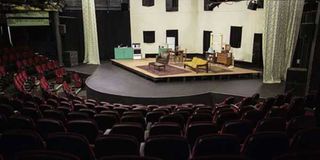South Africa's anti-apartheid theatre battles on after 40 years

A general view of the stage of the John Kany theatre at the historic Market Theatre in Johannesburg. South Africa's Market Theatre opened its doors in downtown Johannesburg in 1976 at the dawn of violent black uprisings against the apartheid regime. AFP PHOTO | GIANLUIGI GUERCIA
What you need to know:
- For the first time the theatre last year produced a play in the local Setswana language.
- In 1987 it caused a stir when award-winning black actor John Kani kissed a white woman in Shakespeare's classic Othello.
JOHANNESBURG
South Africa's Market Theatre opened its doors in downtown Johannesburg in 1976 at the dawn of violent black uprisings against the apartheid regime, becoming the crucible of protest theatre.
Forty years on and two decades after the end of apartheid, the Market's days of shocking the nation by showing a black man kissing a white woman are long gone.
But the theatre which grew alongside the struggle for liberation remains a symbol of hope — this time against social suffering and despair.
Nestled in the centre of Newtown at the heart of Johannesburg's cultural precinct, the Market staged its first show, Anton Chekhov's The Seagull, in which the protagonist Konstanin searches for his own identity through his writing.
The inaugural show was just five days after the 1976 Soweto uprising when black students protested against the use of Afrikaans as the primary language in their schools — one of the defining moments of the anti-apartheid struggle.
It was then that protest theatre germinated and black talent was discovered and developed in a playhouse built on what was once a vegetable market.
The theatre has been credited with helping to drive the South African struggle against the oppressive white regime.
"It was symbol of defiance," said Grace Mokoena, who has worked at the Market Theatre as front office manager for the past 20 years.
"The change that it has made can never be taken for granted."
Veteran playwrights and actors recall with nostalgia how the theatre became the window through which the world saw what was happening in the country when blacks were segregated from whites.
At a time when news was strictly controlled, "theatre let the outside know what was going on through plays," said Zakes Mda, one the country's leading playwrights.
"That's how the world got inside, into the nature, the working of apartheid."
BLACK ACTOR
In 1987 it caused a stir when award-winning black actor John Kani kissed a white woman in Shakespeare's classic Othello.
"It caused havoc ... critics went wild but we went on," said Mokoena. "They called it protest theatre, we called it theatre for the people."
Arts Minister Nathi Mthethwa said the theatre was a "catalyst to a lot of dialogues that happened between people who were artificially separated by the system of the time".
"The Market Theatre ... said to everybody in this country there is a possibility of a South Africa that is not stifled by apartheid laws."
Four decades after the curtain first rose, the Market Theatre is determined to survive in an era of Internet entertainment and social media activism.
Rehearsing a drama about poverty and homelessness in Johannesburg, actor and dancer Tshepi Matshego, 30, said that the theatre is keeping its tradition alive.
The Market was known for going "against the grain and telling all those important stories. It's still continuing in that vein," she said.
For the first time the theatre last year produced a play in the local Setswana language.
It is now working on a play in French to cater for hundreds of thousands of migrants from French-speaking African countries.
Because of the prominent role it played in the fight against apartheid, the Market Theatre "has a great legacy," said artistic director James Ngcobo.
"We are going for some opera, some dance. We want to chart new waters".





